Or if you prefer your proverbs biblical, “Do not be deceived: Bad company corrupts good character.” (1 Corinthians, 15:33)
After Wendy’s latest public relations play, OSU administration must decide how far it will allow its fast-food partner to drag a proud university down into the mud…
Benjamin Franklin’s Poor Richard’s Almanac is generally credited with popularizing the colorful aphorism, “He that lieth down with the dogs shall rise up with fleas.” It is an age old proverb that is widely understood to mean that one should choose carefully the company one keeps, lest the sins of your associates become your own in the eyes of the public.
And in the wake of the most recent developments in the Wendy’s Boycott, it is a saying that administration officials at The Ohio State University would be wise to consider as they ponder whether to renew Wendy’s campus lease in the face of student protests over labor conditions in the company’s supply chain.
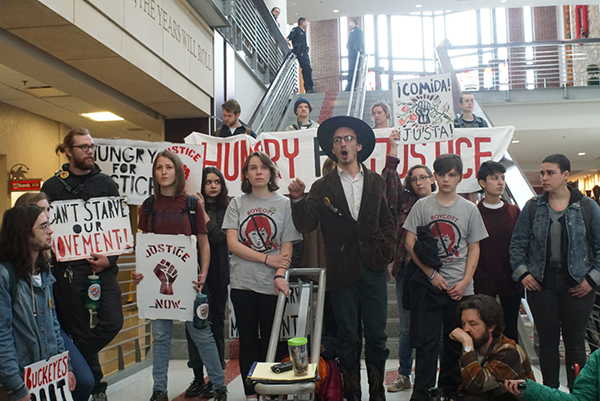
Now that the students’ weeklong fast is over and the Return to Human Rights Tour has finished, we thought we’d take stock of where things stand in the Wendy’s Boycott, to recap Wendy’s inexplicably obstinate — and increasingly unprincipled — resistance to joining the Fair Food Program. We’ll also take a look at what Wendy’s latest transgressions might mean for its campus partner, the OSU administration, and for the administration’s commitment to honor students’ ethical concerns when doing business in the university’s name.
First, a quick recap of Wendy’s record of resistance to the Fair Food Program…
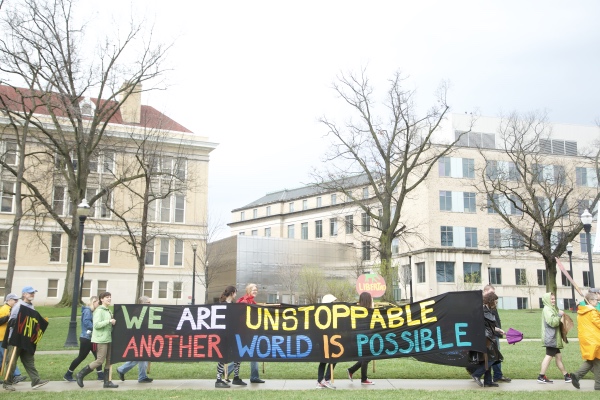
Let’s start with a quick reminder of where Wendy’s stood vis-à-vis the Fair Food Program before last month’s fast at OSU and the CIW’s 14-city boycott tour. Here’s what we wrote in March of last year when we launched the Wendy’s boycott:
- Wendy’s has shifted its purchases from Florida to Mexico: Wendy’s has not only refused to join the FFP, but has stopped buying tomatoes from Florida altogether following the implementation of the Fair Food Program there. Rather than support US growers setting new standards for human rights in the agricultural industry, Wendy’s took its tomato purchases to Mexico, where the widespread denial of human rights in the produce industry was the subject of an in-depth expose by the Los Angeles Times just one year ago.
- Wendy’s has chosen public relations over human rights protections: Instead of joining the Fair Food Program and its widely-acclaimed, uniquely successful worker-driven model of social responsibility, Wendy’s released a new supplier code of conduct this past January that contains no effective mechanisms for worker participation or enforcement. Wendy’s new code represents the very worst of the traditional corporate approach to social responsibility driven by public relations concerns rather than the verifiable protection of human rights.
- Wendy’s is profiting from farmworker poverty: Wendy’s stands alone as the last of the five major US fast food corporations to refuse to join the FFP: McDonald’s, Yum! Brands, Subway, and Burger King are all part of the Program. By refusing to participate, Wendy’s is deriving a very real cost advantage over its competitors, while continuing to provide a market for less reputable growers.
That was reason enough to justify a national boycott of Wendy’s in 2016, only the second boycott in the 17-year history of the Campaign Fair Food. And it was reason enough for the administration at OSU to agree to add the following clause to its lease with Wendy’s last year after meetings with the Student/Farmworker Alliance chapter on campus:
“Whereas, Landlord and Tenant desire to confirm that the Lease is being renewed for a one (1) two (2) year term, that Tenant shall have three remaining one-year options to renew the Lease, and that Tenant’s ability to exercise its options shall be conditioned upon a satisfactory resolution of the concerns of Student Farm Workers Alliance with regard to the Tenant sourcing of tomatoes for the business that Tenant is operating on the premises.”
Wendy’s superficial efforts to “enhance and expand” its supplier code of conduct in the weeks ahead of this year’s Return to Human Rights Tour did nothing to substantively change the picture, beyond serving as a tacit admission that the company’s efforts to date fall woefully short of the standards set by the Fair Food Program (see our analysis, “It’s still a pig,” 3/3/17, for more on that particular public relations gambit).
And that is where things stood last month, as students at OSU prepared to fast for a week to call attention to the administration’s failure to honor its promise to hold Wendy’s accountable to their concerns, and farmworkers in Immokalee prepared to hit the road for two weeks to take the message of Wendy’s unconscionable intransigence to consumers in 14 cities, from Gainesville, Florida to Columbus, Ohio.
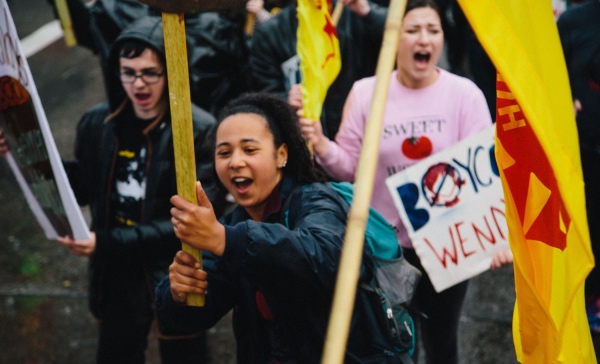
In a new twist, an increasingly desperate Wendy’s takes a page from an already discredited public relations playbook…
But, almost inconceivably, Wendy’s public relations efforts took a turn for the worse during the two weeks of action in March. In so doing, the company made itself an even more problematic partner for OSU administration officials hoping to convince concerned students that continued engagement with Wendy’s is the best strategy for reforming the fast-food giant’s approach to social responsibility.
Apparently feeling the heat from the student fast and the growing support for the boycott across the country, Wendy’s tried a new play from the corporate crisis management playbook when responding to the many press calls during the two-week tour. Sadly, it was not only a dirty play, but one that had been tried before and failed, rather spectacularly in fact.
To wit, here’s an excerpt from the Columbus Dispatch article on last month’s big march through downtown Columbus (“Protesters call on Wendy’s to sign worker-protection pledge,” 3/26/17):
… A number of major food companies, including Burger King, McDonald’s, Yum Brands (Taco Bell), Whole Foods, Trader Joe’s and Wal-Mart have signed on. The program has been lauded by the United Nations, an advisory council to President Barack Obama, The Washington Post, The New York Times and PBS.
Participating food companies also agree to pay participating farms an extra penny per pound of tomatoes, and that’s where much of the dispute with Wendy’s lies. Wendy’s considers the extra penny to be a fee paid to the coalition, spokeswoman Heidi Schauer said in an email. (emphasis added, read more)
That final sentence — “Wendy’s considers the extra penny to be a fee paid to the coalition, spokeswoman Heidi Schauer said in an email” — or a variation on it appeared in article after article during this year’s tour, and it sounded a troublingly unprincipled new note in Wendy’s public relations response to the boycott.
Where have we heard this before?…

Before we take a quick trip back in Campaign for Fair Food history, even patently baseless attacks like this require a recitation of the (already well-documented) facts, so here we go: The penny-per-pound premium paid by participating buyers in the Fair Food Program is paid to the participating growers from whom they purchase tomatoes, not to the CIW. The participating growers in turn pass the premium on to workers in the form of a bonus (retaining 13% to cover the increased payroll taxes created by the bonus). The premium is not — and cannot in any rational way be “considered” — “a fee paid to the coalition.” To suggest otherwise is not only dishonest, it is unworthy of a major corporation at this point in the history of the FFP. Wendy’s obviously does not care if its intentionally incendiary claim is true, as one phone call to any one of the 14 companies that are actually participating in the FFP and paying the penny-per-pound premium to their growers, and not to the CIW, would have served to clear up any confusion.
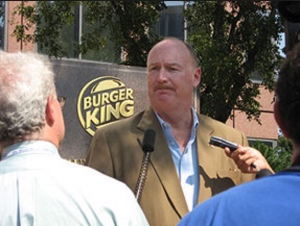 Those who have followed the Campaign for Fair Food since the early days might actually recognize Wendy’s new public relations gambit. A similar tactic played a pivotal role in the Burger King campaign nearly a decade ago, when Steve Grover (right), Burger King’s Vice President for Global Food Safety and Compliance, was called out for attempting to smear the CIW with demonstrably false accusations of corruption:
Those who have followed the Campaign for Fair Food since the early days might actually recognize Wendy’s new public relations gambit. A similar tactic played a pivotal role in the Burger King campaign nearly a decade ago, when Steve Grover (right), Burger King’s Vice President for Global Food Safety and Compliance, was called out for attempting to smear the CIW with demonstrably false accusations of corruption:
Burger King has echoed these statements and refused to sign a deal with the coalition, citing an array of concerns – including how the extra money would be distributed. At one point, Burger King Vice President Stephen Grover told reporters he was concerned the coalition was pocketing the extra money. After several independent groups that verified the agreements dismissed the allegations, Burger King officials stopped repeating them.
The attack strategy backfired. Grover was soon fired for his efforts (after being caught red-handed continuing to make “false and derogatory comments about the CIW online” under a pseudonym), and Burger King ended up signing a Fair Food agreement shortly thereafter, clarifying that the attacks were unfounded and apologizing for “any negative statements about the CIW or its motives.” From the joint press release announcing the agreement:
John Chidsey, chief executive officer of Burger King Corp., said, “We are pleased to now be working together with the CIW to further the common goal of improving Florida tomato farmworkers’ wages, working conditions and lives. The CIW has been at the forefront of efforts to improve farm labor conditions, exposing abuses and driving socially responsible purchasing and work practices in the Florida tomato fields. We apologize for any negative statements about the CIW or its motives previously attributed to BKC or its employees and now realize that those statements were wrong. Today we turn a new page in our relationship and begin a new chapter of real progress for Florida farmworkers…” read more
Wendy’s would do well to take note of the ultimate conclusion of this particular cautionary tale.
[It is also worth noting that the Wendy’s spokesperson, Heidi Schauer, quoted in the excerpt from the Dispatch, is a fairly recent hire, joining Wendy’s in June of last year. Before coming to Wendy’s, Ms. Schauer worked for nearly a decade as a Director at the DCI Group in Washington, DC, according to her LinkedIn page. The DCI Group website lists “Strategic Communications” among the services they offer, including “Original research that helps inform and frame your issue – and your opposition – correctly; consumer research to understand what people are thinking, and how they react to certain words and concepts…” In the words of Justin Peterson, a Managing Member at DCI:
People often hire us because they’re on the defensive. We help our clients go on the offensive by finding better and more creative ways to help make their case.
It was shortly after Ms. Schauer’s hiring that Wendy’s communications strategy took a hard turn toward the sort of baseless attack that was repeatedly deployed during press coverage of the recent tour.]
So where does this all leave the administration at OSU and the decision before it regarding Wendy’s campus lease?
We began this rather lengthy post with a quote from Benjamin Franklin’s Poor Richard’s Almanac about what happens when you lie down with dogs. But we would like to close the post with perhaps an even more apt analogy to the situation facing OSU’s President Drake and his fellow administration officials in the wake of the students’ recent fast.
As anyone who has taken a lifesaving course knows, one of the most dangerous things you can do is jump into the water to save a person who is drowning. The online help site Quora explains:
If you haven’t been trained in water lifesaving and you jump in the water to save someone you’ll end up drowning yourself. When a person is drowning, unless they’re unconscious, they aren’t thinking rationally. They will grab you and possibly even attack you. Even strong swimmers could drown if a victim grabs them.
The illustration above demonstrates the proper way to save someone who is flailing and going under — do not get into the water yourself, but stand firmly on solid ground and find a tool, a form of leverage, to help pull the person out of the deep water and back to shore.
The same principle holds when trying to save a drowning corporation. Wendy’s has been struggling against the tide of ethical supply chain management in the fast-food industry for the better part of a decade now, with each desperate effort to fight the inevitable flow of progress — from refusing to join the Fair Food Program to shifting its purchases to Mexico and issuing an empty supplier code of conduct — only drawing them into deeper and deeper waters. Now, unable to win the substantive debate on social responsibility, Wendy’s has turned to ad hominem attacks against the CIW in an attempt to reframe the discussion, the same kind of baseless attacks that resulted in the firing of a Burger King executive and the subsequent signing of that company’s Fair Food agreement with the CIW. Wendy’s is flailing now and sinking fast, and it is indeed an alarming sight from the shore.
But this is where the OSU administration needs to proceed with caution. Embracing Wendy’s, apparently in the misguided hope that OSU has sufficient influence over the fast-food giant to save it from itself, will only result in Wendy’s pulling the administration down with it. It will not result in Wendy’s joining the Fair Food Program, because, quite simply, as a partner in a single restaurant, OSU does not have sufficient leverage over the international chain with thousands of restaurants worldwide. Instead, Wendy’s will only continue to struggle against long-overdue social progress and frustrate OSU students, whose concerns about gross human rights violations behind the food they eat on campus are legitimate.
Instead, the best course of action at this point is for the administration to use the one form of real leverage available to it — OSU’s immense footprint in the collegiate universe — and cut its contract with Wendy’s until the company joins the Fair Food Program, which Professor James Brudney (international labor law expert and previously a professor at OSU’s Moritz College of Law for nineteen years) calls, “substantially more successful than other corporate compliance programmes.”
While it is true that OSU is the site of only one restaurant and so does not have the market power to influence Wendy’s by leveraging the value of its campus sales, the university does wield tremendous influence in the marketplace of ideas among this country’s colleges. The administration could, and should, leverage its leadership in that marketplace by being the first university to cut its contract — as the University of Chicago was during the seminal Taco Bell boycott. That decision led more than two dozen other schools to follow suit, which collectively created real market power that Taco Bell could not ignore. The University of Chicago sparked a chain reaction that played a significant role in bringing Taco Bell to the table and laid the foundation for all the unprecedented human rights gains that ultimately followed for tens of thousands of farmworkers thanks to the Fair Food Program.
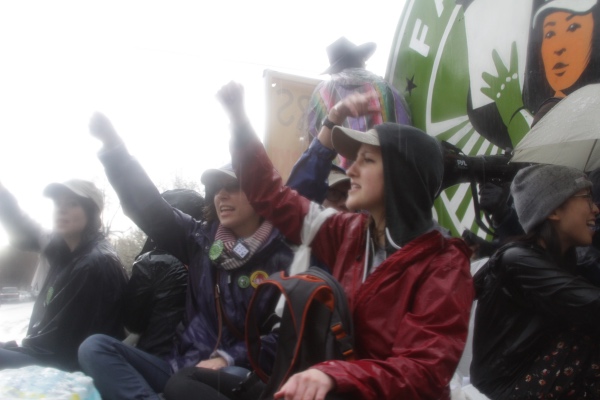
Today, it is OSU that is in a unique position to precipitate a chain reaction that will lead, ultimately, to Wendy’s doing the right thing and joining the Fair Food Program. But unless the administration honors its commitment to the Student/Farmworker Alliance and terminates OSU’s lease with Wendy’s, that reaction will have to await a more principled stance by another university.
And that is precisely why Wendy’s is fighting so hard for one otherwise inconsequential lease, one restaurant that represents roughly 0.015% of the 6,500 restaurants operating under its brand worldwide.
Let’s hope the administration chooses to break clear of Wendy’s embrace rather than be drawn still deeper into the murky waters where Wendy’s now finds itself. That choice would put OSU on the same firm ground of respect for fundamental human rights that its students occupy today, and allow the university to use its true leverage — not its market power as a partner in one Wendy’s restaurant, but its leadership in the national community of universities — to pull Wendy’s back to the safe harbor that is the Fair Food Program.

